Low-Calorie Fruits and Vegetables: Eat Light, Feel Right
In the world of counting calorie content, fruits and veggies often get a bad rap. The truth is, some of them are not the culprits but the essentials in your health journey. Now, it is time to ditch the misconceptions! Let’s take a step into the reality of a world filled with nutrient-rich, low-calorie fruits and vegetables.
Keep reading to discover the nutrient-rich, low-cal fruits and veggies that can redefine your approach to a healthier lifestyle. Your taste buds are in for a treat!
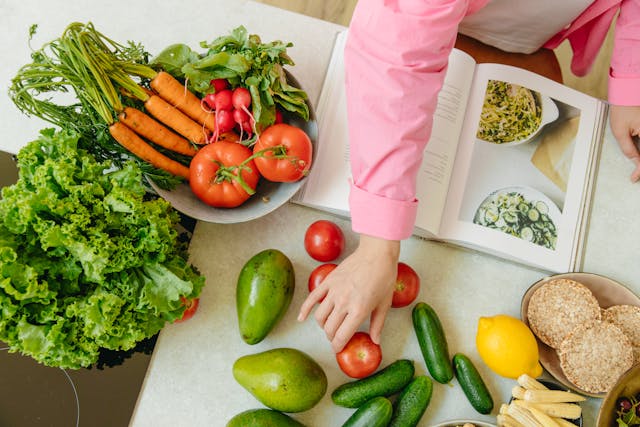
Are Fruits and Vegetables Low in Calories?
Are fruits and vegetables truly low in calories? Fruits and vegetables are generally low in calories. That is why they are a healthy choice for those looking to manage their weight.
Bananas, dates, mangoes, raisins, figs, and prunes are examples of high-calorie fruits. On the other hand, potatoes, sweet potatoes, corn, lentils, avocado, and beets fall into the category of high-calorie vegetables.

Common Misconceptions About Low-Cal Veggies and Fruits
Let’s bust some common myths about the nutritional goodness of our favorite low-cal veggies and fruits. Here are some common misconceptions about fruit and vegetable nutrition.
- All Fruits Are Created Equal: They are not equal. Different fruits offer varying levels of vitamins, minerals, and antioxidants.
- Dried Fruit Is a Low-Calorie Snack: Drying concentrates, sugars, and calories. While nutrient-dense, dried fruits can be higher in calories than their fresh counterparts.
- Vegetables Are Bland and Lacking in Nutrients: No. Vegetables offer a wide range of flavors, textures, and nutrients. By experimenting with cooking methods and seasonings, you can unlock their diverse and delicious potential.
- All Fruits Are High in Sugar: Not all. While fruits contain natural sugars, the overall caloric impact varies based on how much you consume.
- Fruits Should Be Avoided in the Evening: No, eating fruits in the evening is not inherently problematic; it’s a personal choice without scientific backing. In moderation, fruits make a healthy and satisfying evening snack.
- Eating Fruits Leads To Weight Gain: No, eating fruits does not inherently lead to weight gain. Moderation is crucial, and when incorporated sensibly into a balanced diet. Hence, fruits are not a cause of weight gain.
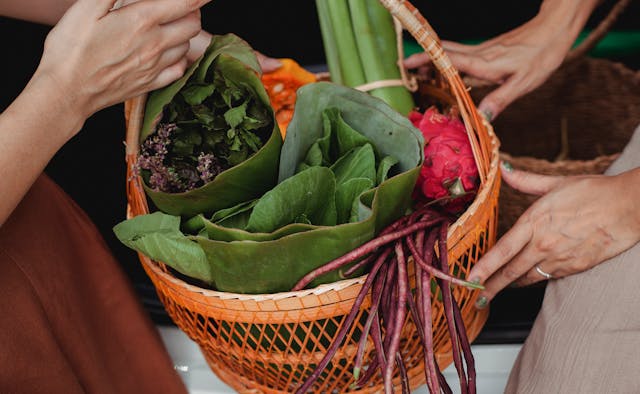
Low-Calorie Fruits and Veggies: What Nutrients Do They Offer?
With low-calorie fruits and vegetables, their nutritional profile is not only light on calories but also rich in essential nutrients. These are the nutrients you can get from low-calorie fruits and veggies.
Vitamins and Minerals
Low-calorie fruits and veggies are rich sources of essential vitamins and minerals. These nutrients play crucial roles in supporting various bodily functions. It includes immune system function and promoting healthy skin and hair. They provide vitamins and minerals like:
- Vitamins
- Vitamin A
- Vitamin B complex (B1, B2, B3, B5, B6, B7, B9, B12)
- Vitamin C
- Vitamin D
- Vitamin E
- Vitamin K
- Minerals
- Calcium
- Iron
- Magnesium
- Phosphorus
- Potassium
- Zinc
- Selenium
- Copper.
- Manganese
High Fiber Content
One notable feature of low-calorie calorie fruits and vegetables is their high dietary fiber content. Fiber is key for maintaining digestive health and can contribute to a feeling of fullness. Incorporating these low-cal veggies and fruits into your diet supports regular bowel movements and helps in weight management.
Antioxidant Properties
Low-calorie options actively defend your health by offering essential antioxidant properties. These properties play a crucial role in neutralizing harmful free radicals within your body. How? by actively protecting your cells from oxidative stress.
Hydration Benefits
Fruits and veggies have high water content. And yes, it can add to your daily fluid intake. Adequate hydration is vital for optimal bodily functions. These high water-content fruits and veggies can contribute to keeping you refreshed and hydrated.
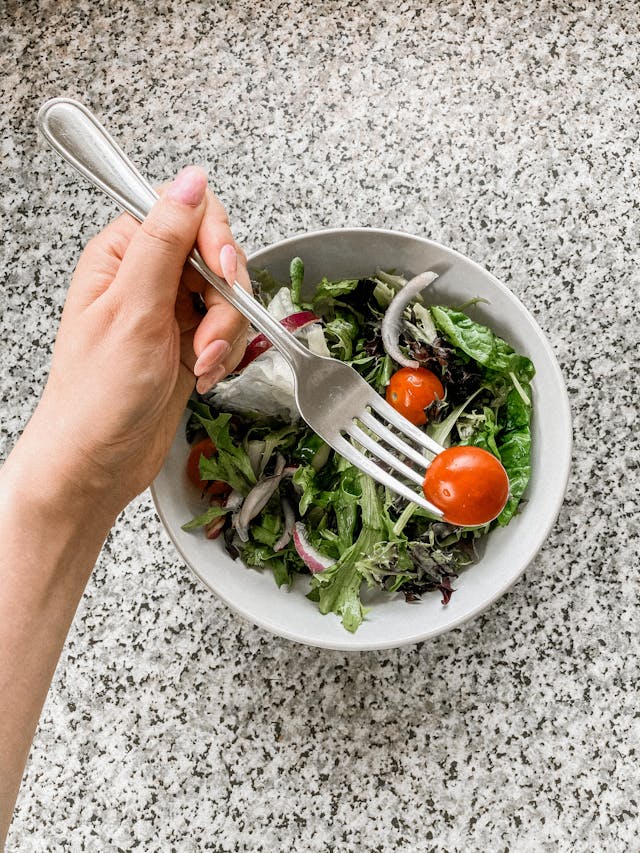
What are Low-Cal Veggies?
Exploring low-calorie vegetables opens the door to a variety of nutrient-packed options that won’t weigh you down. Here are your low-cal veggies options:
1. Celery
Celery is a crisp and crunchy vegetable with a high water content.
- Serving Size: 1 cup (120 grams)
- Calories per cup: 17
2. Cucumber
Cucumbers are refreshing vegetables with a mild flavor. They have a high water content, making them ideal for hydration.
- Serving Size: Half a cup (52 grams)
- Calories: 8
3. Iceberg Lettuce
Iceberg lettuce is a crisp, leafy green with a high water content—an excellent source of Vitamin K, provitamin A, and folate.
- Serving Size: 1 cup (57 grams)
- Calories per cup: 8
4. Radishes
Radishes are crunchy root vegetables with a peppery flavor. They come in various flavors, ranging from mildly sweet to spicy. They’re rich in Vitamin C, potassium, and folate.
- Serving Size: 1 cup (116 grams)
- Calories per cup: 19
5. Jicama
Jicama is a crunchy vegetable with a slightly sweet, nutty flavor. It is a great source of fiber, vitamin C, and potassium.
- Serving Size: 1 cup of raw jicama (130 grams)
- Calories per cup: 49
6. Chard
Chard is a leafy green vegetable with colorful stems. It has a slightly bitter taste and is rich in vitamin K.
- Serving Size: 1 cup (36 grams)
- Calories per cup: 7
7. Spinach
Spinach is versatile and tender, leafy green with a mild flavor. It is rich in vitamins and minerals such as Vitamin K, provitamin A, folate, and carotenoids (lutein, zeaxanthin).
- Serving Size: 1 cup (30 grams)
- Calories per cup: 7
8. Watercress
Watercress is a peppery and leafy green vegetable rich in vitamin K, vitamin C, and vitamin A.
- Serving Size: 1 cup (34 grams)
- Calories per cup: 4
9. Broccoli
Broccoli is a cruciferous vegetable that is rich in Vitamin C. They also contain compounds that can help reduce heart disease and cancer risk.
- Serving Size: 1 cup (155 grams)
- Calories per cup: 54
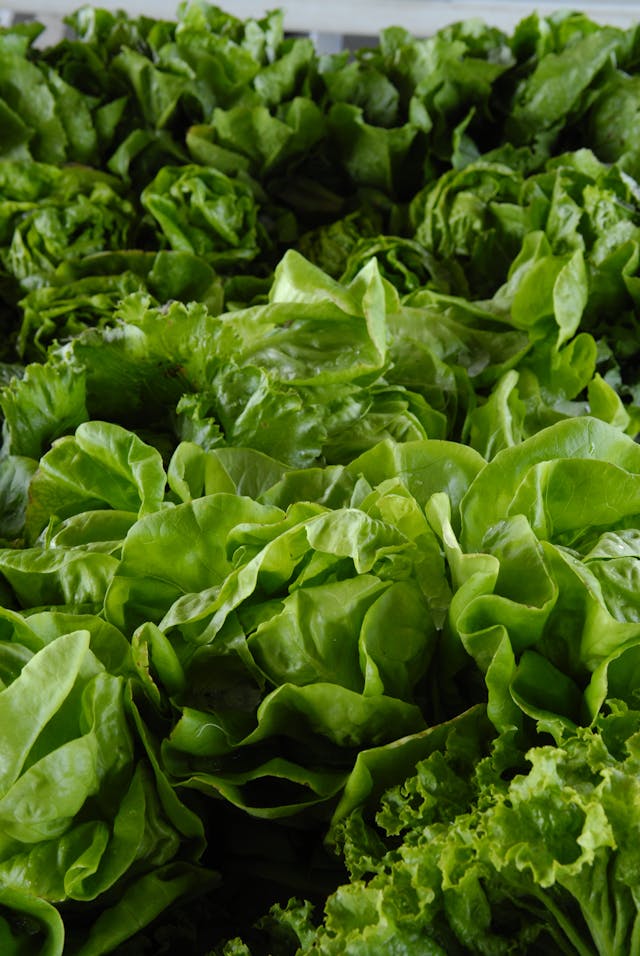
What are the Low-cal Fruits?
From the crispness of apples to the tropical allure of papaya, each fruit beckons indulgence without compromising health goals. These low-cal fruits are:
1. Clementines
Clementines are small citrus fruits resembling miniature oranges. They are popular for their bright, tart flavor and high vitamin C content.
- Serving Size: One fruit (74 grams)
- Calories: 35
2. Strawberries
Strawberries are sweet, vibrant red berries with a juicy texture. They are rich in antioxidants.
- Serving Size: 1 cup (166 grams)
- Calories: 53
3. Grapefruit
Grapefruits are large citrus fruits with a distinctive tart taste. They come in various varieties, each offering a refreshing burst of flavor. Grapefruits are rich in vitamin C and antioxidants.
- Serving Size: Half a grapefruit (123 grams)
- Calories: 37
4. Apples
Apples are highly nutritious fruits with a crisp texture. They come in various colors and varieties that offer a blend of sweet and slightly tart flavors. Apples are rich in fiber, vitamin C, and potassium.
- Serving Size: 1 cup of apple slices (109 grams)
- Calories: 62
5. Papaya
Papaya is a tropical fruit with orange flesh and black seeds. It has a sweet taste and a soft, buttery consistency. The main nutrients in papayas are Provitamin A, vitamin C, folate, and potassium.
- Serving Size: Small papaya (157 grams)
- Calories: 68
6. Watermelon
Watermelon is a hydrating and refreshing fruit with juicy, pink flesh and black seeds. It has a high water content, and it is rich in vitamin C.
- Serving Size: 1 cup of watermelon balls (154 grams)
- Calories: 46
7. Orange
Orange is a citrus fruit with a sweet and tangy flavor. They are famous for their bright orange color and are among the popular choice for fresh fruit juices. Oranges are rich in vitamin C and fiber.
- Serving Size: One medium orange (131 grams)
- Calories: 62
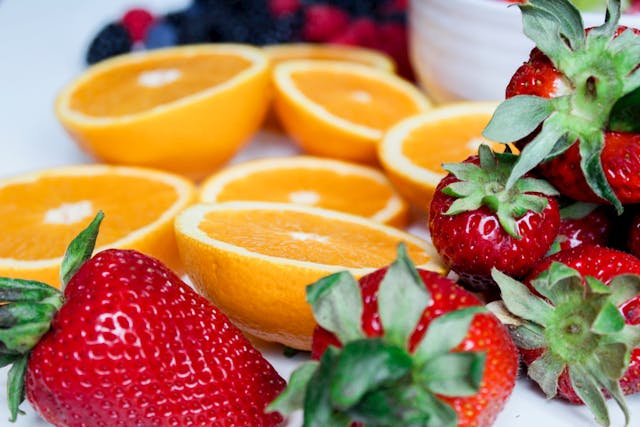
Preparation and Cooking Tips To Enjoy Low-Cal Veggies
Discover delightful ways to savor the goodness of low-cal veggies. Incorporating these nutrient-packed options into your meals can be both exciting and healthy. Here are some preparation and cooking tips to elevate your veggie experience:
Stir-Fry
Lightly sauté celery, cucumber, and spinach with a dash of olive oil for a flavorful, nutrient-rich dish.
Roasting
Unlock the natural sweetness of vegetables through roasting. Try carrots, jicama, and radishes roasted with a sprinkle of herbs for a tasty and low-calorie side.
Salads
Create vibrant salads by combining an array of low-cal veggies like watercress, iceberg lettuce, and chard. Add some zesty salad dressings or a squeeze of lemon for a refreshing treat.
Eat Them Raw
Embrace the crunch by enjoying some vegetables in their raw form. Celery sticks, radishes, and cucumber strips make for convenient and low-calorie snacks.
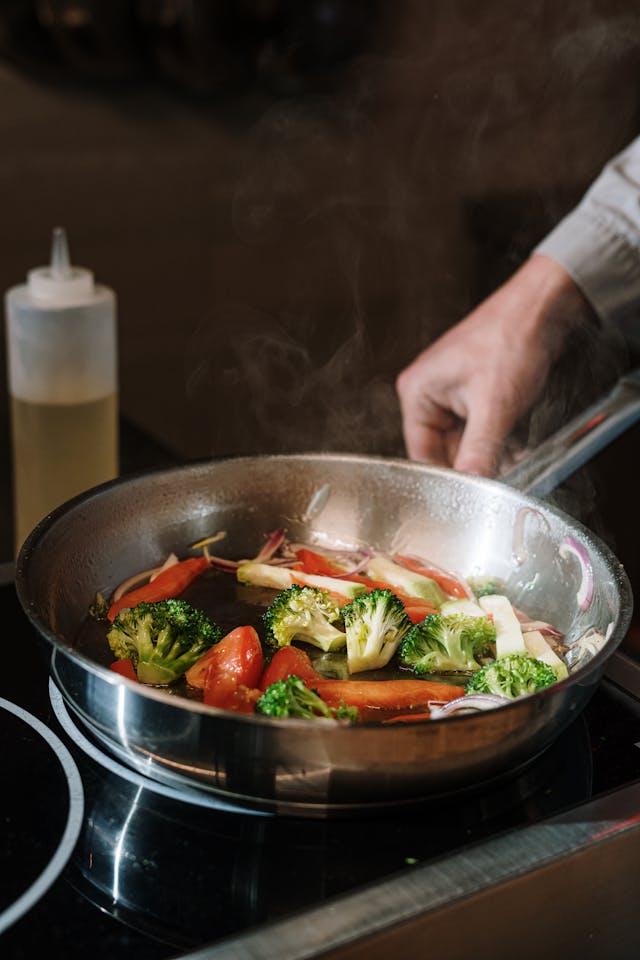
Preparation and Cooking Tips To Enjoy Low-Cal Fruits
You can transform your low-cal fruit indulgence into a healthy and delightful experience. Unleash the natural sweetness of low-calorie fruits with these preparation and serving tips:
Simple Fruit Bowls
Create easy and visually appealing fruit bowls by combining a variety of low-calorie fruits. You can have a combination of clementines, strawberries, and grapefruit, for example.
Smoothie Creations
Blend your favorite low-cal fruits into refreshing smoothies. Mix and match flavors like apples, papaya, and watermelon for a nutritious and satisfying beverage.
Fruit Skewers
Create colorful fruit skewers with low-calorie options like strawberries, clementines, and watermelon. It’s a fun and portable way to enjoy these fruity delights.
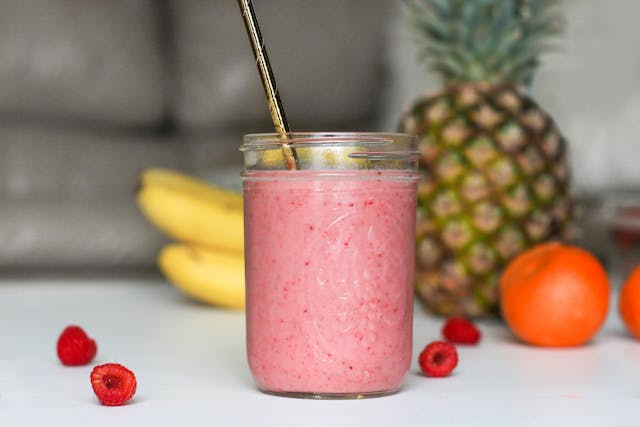
Grocery Shopping Tips on Choosing Low-Calorie Fruits and Vegetables
Grocery shopping for low-calorie fruits and vegetables becomes a breeze with these insightful tips:
- Opt for a diverse array of colorful fruits and vegetables to ensure a broader nutrient intake.
- Choose in-season options for freshness and affordability.
- Prioritize fresh produce over processed alternatives for higher nutritional value.
- Select fruits and vegetables at different ripeness stages for flexibility and reduced waste.
- Explore farmer’s markets for fresh, local, and potentially more affordable options.
- Consider frozen fruits and veggies for nutrition and extended shelf life.
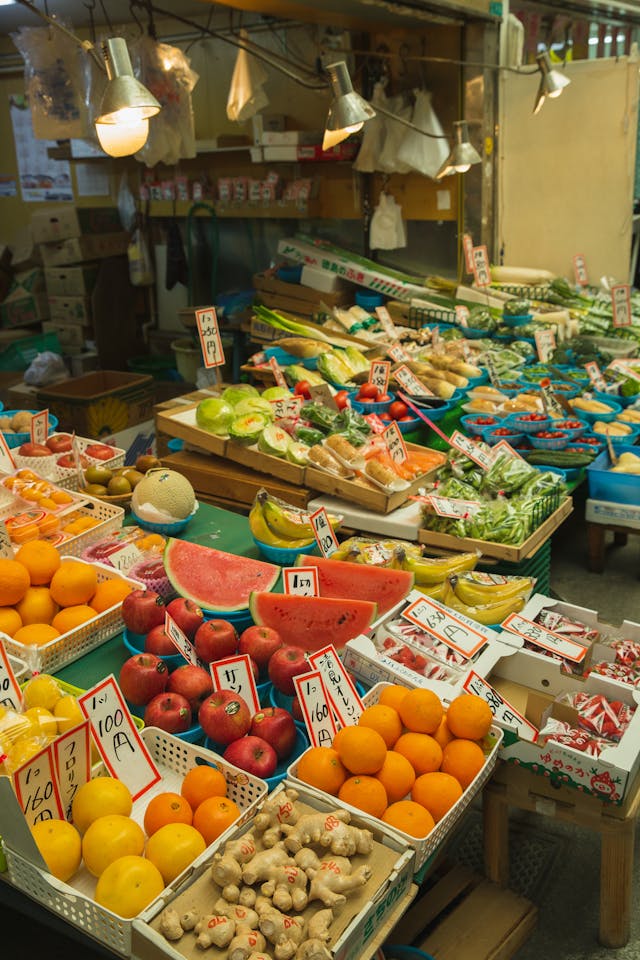
Elevate Your Well-being With the Goodness of Low-Calorie Fruits and Vegetables
Revitalize your well-being by savoring the vibrant flavors and nutritional benefits of low-calorie fruits and vegetables.
At ModernFit, we are your ultimate wellness companion. We offer personalized nutrition plans, expert guidance, and a supportive community.
Join us to enjoy a balanced calorie intake and a delicious approach to healthy living!


